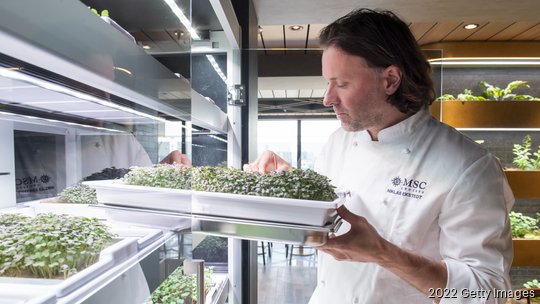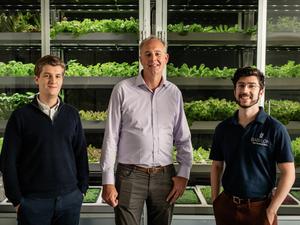
Richmond vertical farming company Babylon Micro-Farms has completed an $8 million series A funding round it intends to use to boost its operations and grow its market share.
The round was led by Greenville, South Carolina’s Venture South and included participation from the Virginia Innovation Partnership Corp.’s Virginia Venture Partners, Bethesda, Maryland’s Hull Street Capital and Houston’s New Theory Ventures.
“We found new and current investors who believe in us,” said Alexander Olesen, CEO and co-founder of Babylon Micro-Farms. “They see that the fundamentals of the business are strong.”
The company also recently received a $500,000 grant from the National Science Foundation. The new funding brings Babylon's lifetime total to $19.1 million raised, according to Crunchbase.
Babylon Micro-Farms builds indoor vertical farming systems. The company sells the units and manages the growing environment through a subscription service. The systems produce salad greens, herbs and edible flowers. Olesen said the company is developing additional products, including strawberries and other fruit and viny crops.
“The units are designed to be turnkey vertical farming systems for people with no prior growing experience,” Olesen said. “We get a lot of feedback on the aesthetic. People comment that the units are beautiful and something people are proud to have.”
The company has carved out a niche in the competitive vertical farming business. Babylon Micro-Farms markets to large dining facilities in hospitals, universities and retirement homes. Its system provides supplemental food for these operations.
In recent years, the industry has grown in popularity, but Olesen said it is also a challenging time for vertical farming. Orlando hydroponic vertical farming company Kalera filed for Chapter 11 bankruptcy protection earlier this month, while Israeli-Dutch vertical farming company Future Crops filed for bankruptcy in January citing high energy costs.
“It’s important to realize that we have our niche,” Olesen said. “Vertical farming is kind of an umbrella term. One of the key differentiators that has emerged for us in the recent correction is that you can either be a technology provider or a grower of produce. It’s very hard to be both. For us, it’s lucky that we are developing growing modules and technology to support them. We are not selling produce. We know our lane.”
Babylon Micro-Farms has 35 employees. Olesen declined to provide revenue numbers. The funding will be used to streamline the company’s manufacturing process and to expand its sales, marketing and engineering staff.
The company’s seeds were planted at the University of Virginia, where Olesen and co-founder Graham Smith developed a growing system for a school project. The company was founded in 2017 in Charlottesville. A few years later, it relocated to Richmond where it is headquartered in Scott’s Addition.
The company started the fundraising effort last year, and it took months to complete. Olesen said the fundraising environment changed as the company started to approach investors.
“I think the environment really changed under our feet,” he said. “While we were raising money, the macro environment changed and the venture capital environment changed. It has been a lot worse moving into this year.”
Olesen said he hopes to begin one day marketing the product to individual customers, but for now Babylon Micro-Farms will focus on large institutions. He pointed to Commonwealth Senior Living, a senior living operation with more than two-dozen facilities across the commonwealth, as an example. The company has installed Babylon Micro-Farms units at many of its facilities.
“They are using it to grow fresh produce for their dining operation, because they get a more nutritious product,” Olesen said. “They are also having different harvesting activities every week with the residents. It’s a great case study because people are enjoying the food but also incorporating it into programing and making it an experience.”

